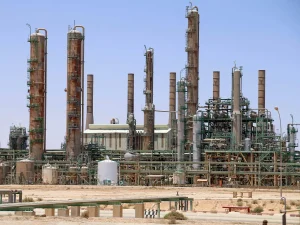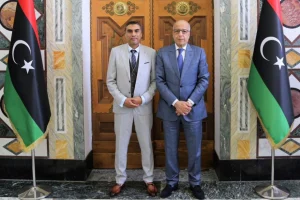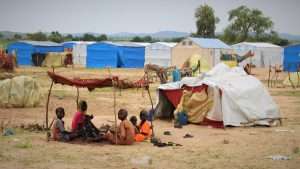Morocco’s push for an investment-grade credit rating

Morocco is on a mission to regain its coveted investment-grade credit rating from S&P Global Ratings, despite grappling with extensive new expenditures stemming from a devastating earthquake and its co-hosting of the 2030 FIFA World Cup, according to Bloomberg, on October 10th.
The north African nation’s commitment to maintaining fiscal discipline remains unwavering, a testament to its resilience and determination.
In the aftermath of a deadly earthquake and with grand sporting ambitions on the horizon, Morocco seeks to restore the budgetary rigor it had before the 2008 global financial crisis.
Finance and economy minister Nadia Fettah Alaoui shared in an interview, “We have the means to fulfill our ambitions and the programs that are on the table,” underscoring Morocco’s determination to achieve its financial goals.
These discussions took place during the annual meetings of the International Monetary Fund and the World Bank in Marrakech, highlighting the nation’s commitment to financial stability.
The earthquake, which struck the High Atlas mountains south of the city, resulted in approximately 3,000 fatalities and numerous displacements.
In response, Moroccan authorities outlined an $11.7 billion recovery plan, a reflection of the country’s commitment to rebuilding and supporting its affected communities.
Furthermore, Morocco, along with Spain and Portugal, is gearing up to co-host the 2030 FIFA World Cup, a massive undertaking that will necessitate substantial investment in stadiums and infrastructure.
Morocco’s creditworthiness faced a decline after S&P and Fitch Ratings downgraded the country to BB+, a rating deep into “junk territory,” following the adverse effects of the COVID-19 pandemic on its tourism-dependent economy.
Nonetheless, in February, Morocco returned to the international debt markets for the first time since losing its investment-grade status, a testament to the country’s resilience and appeal to investors.
Morocco’s economy, valued at $140 billion, has maintained its reputation as an “island of stability” in a region characterized by uncertainty. Nevertheless, rating agencies’ perception of risk in African countries remains a significant challenge. Minister Alaoui echoed the concerns of many developing nations, stating that the rating system is often unfairly penalizing.
African leaders, including Senegalese President Macky Sall, have called for a revamp of the credit rating system, emphasizing that Western bias results in disproportionately high borrowing costs for African nations.
Finance ministers are contemplating the establishment of an independent African Union credit rating agency to address these concerns, a proposal that received support from Morocco during the Marrakech meetings.
Morocco’s government has committed to adhering to a three-year budget plan that prioritizes reduced budget deficits and the stabilization of public debt at around 70 percent of gross domestic product.
Rating agencies have indicated that a marked improvement in Moroccan public finances could lead to an upgrade. Fitch, for instance, has specified that it is closely monitoring Morocco’s ability to achieve a substantial and sustained reduction in the ratio of general government debt to GDP over the medium term.
S&P noted in an April report that they could consider raising Morocco’s ratings if budgetary consolidation proceeds faster than anticipated, leading to a substantial decline in debt-to-GDP ratio while maintaining robust economic growth.
Moody’s Investors Service, another credit assessor, ranks Moroccan debt just one notch above junk.
For now, Morocco’s credit rating outlook remains stable among the three major credit rating agencies, indicating that significant changes are unlikely in the near future.
The country’s ability to secure the financing needed for post-earthquake recovery and FIFA World Cup preparations will be pivotal in determining whether it can regain its investment-grade status.
Much of the funding for post-earthquake reconstruction will come from budget allocations to the affected provinces, while the government aims to boost its revenue through measures such as combatting tax evasion.
The government is also exploring opportunities to collaborate with the private sector on infrastructure projects, including the construction of hospitals and desalination plants.
The latter is particularly critical as Morocco faces dwindling water supplies due to more frequent droughts.
The government is actively seeking private investments to build 10 major desalination plants, with the aim of obtaining over 50 percent of the country’s drinking water from the sea by 2027, a significant increase from the current 10 percent.
The King Mohammed VI Investment Fund intends to select private partners by the end of the year to raise 30 billion dirhams for various projects, including those in agriculture and tourism.
This fund will provide state-owned and private Moroccan firms with financing options to boost investment and expand their businesses.
Once the fund management firms are selected and operational, the aim is to leverage the total capital of 45 billion dirhams to finance projects worth a combined 150 billion dirhams within five years.
Morocco is positioning itself as a reliable and credible partner for investors in renewable energy, emphasizing its potential as a key player in the large spending needs in Africa.
Minister Alaoui maintains that Morocco is on a “positive economic dynamic and is staying the course on its overall macroeconomic trajectory,” despite the challenges it faces.
Want to chase the pulse of North Africa?
Subscribe to receive our FREE weekly PDF magazine












